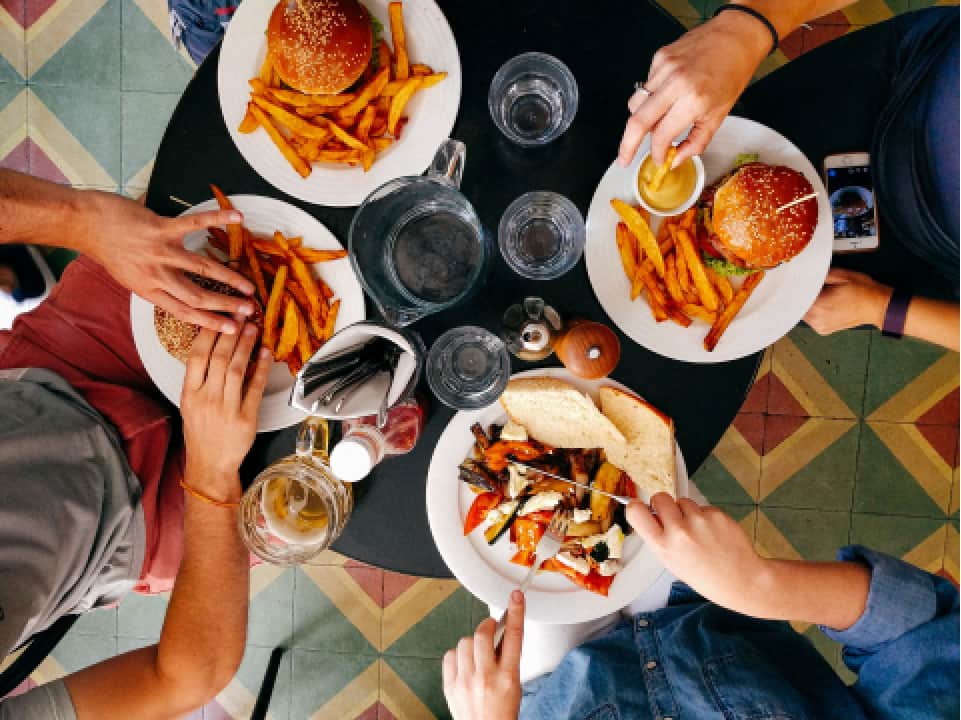Is your night-time eating habits getting in the way of your health and wellness goals? Almost all people who are trying to diet or maybe eat healthier fall into this routine of waking up late at night just to munch snacks. Overeating at night is one of the bad habits that prevent people from losing weight sustainably and successfully.
How overeating at night affects your body?

Eating too much before you go to sleep can cause a lot of problems such as:
- Elevated blood sugar levels
Hypertension and blood sugar levels are very much linked to the habit of overeating at night. If you have this habit, then, you are more prone to heart diseases and diabetes. Taking excess carbohydrates at night can result in elevated blood sugar levels in the morning.
- Sleep disruption
Late-night eaters have the habit of sleeping late, which leads to a disturbed sleep cycle. And even when they try to sleep, they develop mood swings and irritability.
This can indirectly affect their mental health leading to serious problems such as depression, anxiety, and stress. There are many natural remedies that may help you sleep such as consuming chamomile tea, following aromatherapy etc.
- Weight gain
Your body clock goes out of sync when you eat at odd hours. This causes hormonal imbalances, affects sleep as well as a result of unhealthy weight gain. Due to this, your body’s metabolism slows down at night and becomes less effective in burning down the calories.
- Poor digestion
When you eat late night dinner, you are more prone to heartburn and acid reflux. These gastric issues occur due to poorly digested food.
Easy tips to avoid overeating at night

If you want to curb your late-night dinner cravings, consider following the below-mentioned tips.
- Make your daytime meals satisfying.
Depriving yourself to calories during day time may lead to night-time overeating. Make sure that you are well-nourished in the hours leading up to the evening. Never skip your breakfast as it sets the tone of your entire day and can help you feel full at night.
Eat foods rich in proteins throughout the day because they take more time to break down. This makes you eat less at night, and you won’t have to worry about gaining weight.
Avoid drinking sugary juices or sodas. This can mess up with your blood sugar levels leading to late-night overeating. Consider drinking low-calorie beverages or water whenever you feel thirsty.
If you feel hungry during the day time, eat a handful of nuts or your favourite fruits or veggies. Filling up your stomach with healthy foods throughout the day can stop your late-night cravings for food.
- Remove foods that trigger you.

If you have your favourite snack right next to you, it is sure that you will keep focusing on it. Even if you are not hungry, the very sight of the food or snack will trigger you to crave its taste.
Take note of what kind of food triggers you and remove them from your environment. You may find it difficult in the beginning, but once you fight that battle and settle in, you will understand that you never needed that snack/food in the first place.
Sometimes your night-time cravings may be emotionally based. In such a case, develop some self-awareness around this issue. You can start this by keeping a food diary and jotting down your emotions during eating time.
Try to replace your emotional trigger of overeating with a more productive response such as meditation and reading.
- Think about the ‘why’ aspect
Most people tend to overeat at night just because they are bored. All of you might have come across a situation where you have had a satisfying dinner but still have the urge to eat more. Even though you are not hungry, you lurk around the kitchen, searching for those crunchy snacks.
When the night time food cravings trigger you, ask yourself these questions- “Am I hungry? What am I hungry for? What do I actually need?” Understand the difference between physical and emotional hunger.
- Learn to control the hormones behind hunger
An abundance or a deficit in hormones such as ghrelin, leptin, cortisol, and insulin may lead to night time munching. You should have a proper understanding of the behaviours that can affect your hormone levels as well as how to help your body regulate these hormones.
- Ghrelin- Known as the hunger hormone, ghrelin helps to regulate the appetite. This hormone lets you know about when to eat and can be thrown off by poor quality foods and inconsistent eating habits.
- Leptin- This hormone lets your brain know when the stomach is full. But, an increased intake in flour, sugar, processed foods interfere with leptin’s ability to make your stomach feel full. Avoiding sugar and processed calories throughout the day lets leptin to protect you from overeating.
- Cortisol- This is the stress hormone. Even though cortisol is not much related to hunger, a rise in this hormone triggers a rise in blood sugar and insulin. Therefore, increased stress can lead to overeating. Practice yoga and meditation to keep cortisol level under check and hunger at bay.
- Insulin- This helps the body process sugar. Insulin increases greatly in response to empty calories in the form of refined wheat and processed sugars. This increase is temporary, and it later leaves you hungry. Try to avoid white bread, sugary food items, pasta, etc. especially during night time.
If you are not able to overcome late night overeating habits even after following these tips, it would be best that you talk to a health professional. You can also consult doctor online at your convenience. Know that your doctor is there with you and will help you find the right path towards healthier food habits.







